2013 年山东大学考博英语真题
B. at intervals
Part I Grammar and Vocabulary
1. The discussion was so prolonged and exhausting that __________ the speakers
stopped for deferments.
A. at large
2. When traveling, you are advised to take travelers’ checks, which provide a
secure__________
A. substitute
3. I never trusted him because I always thought of him as such a
A. gracious
4. Changing from solid to liquid, water takes in heat from all substances near it,
and this__________produces artificial cold surrounding it.
D. alternative
character.
to carrying your money in cash.
D. particular
B. suspicious
D. at random
C. inference
B. selection
C. at ease
C. unique
D.
December
is
a
Christian
holy
day
usually
celebrated
on
A. absorption
B. transition
B. separately
C. consumption
C. in favor of
C. irrelevantly
D. interaction
5. Language, culture, and personality may be considered__________of each other in
thought, but they are inseparable in fact.
A. Indistinctly
independently
6.
Christmas
25th__________the birth of Jesus Christ.
A. in accordance with
D. in honor of
B. in terms of
7. To survive in the intense trade competition between countries, we must
__________the qualities and varieties of products we make to the world market
demand.
A. improve
8. To give you a general idea of our products, we enclose the catalogues showing
various products handled by us with detailed __________and means of packing.
A. specimens
D. specifications
9. Many of the conditions that __________population pressures --- overcrowding,
unemployment, poverty, hunger and illness --- lead to dissatisfaction.
A. bring forward
10. Arriving anywhere with these possessions, he might just as easily__________for
a month or a year as for a single day.
A. put up
11. The fact that the earth’s surface heats__________provides a convenient way
to divide it into temperature region.
A. infrequently
12. If a cat comes too close to its nest, the mockingbird __________a set of actions
to protect its offspring.
B. give rise to
C. feed up with
D. result from
B. irregularly
B. inspections
C. unsteadily
C. guarantee
C. speed up
B. stay up
D. make up
D. uneverny
B. enhance
D. gear
C. samples
A. hastens
B. releases
C. devises
D. initiates
13. How large a proportion of the sales of stores in or near resort areas can
be__________to tourist spending?
A. attributed
14. Knowledge is a comfortable and necessary retreat and __________for us in an
C. contributed
D. attached
B. applied
�
advanced age; and if we do not plant it while young, it will give us no shade when
we grow old.
A. ingredient
D. inclination
B. reliance
C. shelter
15. Some people would like to do shopping on Sundays since they expect to
__________wonderful bargains in the market.
A. pick up
C. pile up
16. Scientists are searching for the oldest tree __________because it can teach
them a great deal about many issues related with climate change.
D. bring back
B. bump into
A. lively
B. alive
C. living
D. live
B. arrested
B. identification
B. import
B. condoning
D. enveloped
B. assigning
C. involving
D. consenting
C. produce
D. develop
C. spanned
D. suspended
B. provoked
C. summoned
C. acknowledgement
D. compliment
17. The destruction of the Twin Towers in New York City __________shock and anger
throughout the world.
A. tempted
18. A 1994 World Bank report concluded that __________girls in school was probably
the single most effective anti-poverty policy in the developing world today.
A. enrolling
19. The UN official said aid programs will be __________until there is adequate
protection for relief personnel.
A. multiplied
20. Despite almost universal__________of the vital importance of women’s literacy,
education remains a dream for many women in far too many countries of the world.
A. confession
21. Since the island soil has been barren for so many years, the natives must now
__________much of their food.
A. deliver
22. Because Jenkins neither __________nor defends either management or the striking
workers, both aides admire his journalistic
A. criticizes...acumen
dismisses…flair
23. Some anthropologists claim that a few aps have been taught a rudimentary sign
languages, but skeptics argue that the apes are only __________their trainers.
A. imitating
24. It is ironic that the__________insights of the great thinkers are voiced so
often that they have become mere
A. oriinal … cliches
philosophical-questions
inevitable__________, when weight loss
A. moods … accelerates
plateaus… slows
26. Since the author’s unflattering references to her friends were so__________,
she was surprised that her__________were recognized.
A. laudatory … styles
critical… eulogies
27. If it is true that morality cannot exist without religion, then does not the
D.
25. The most frustrating periods of any diet are the
C. holidays … contracts
C. oblique … allusions
B. obvious … anecdotes
B. attacks…neutrality
C. confronts…aptitude
D.
B. banal … beliefs
C. dubious … habits
C. instructing
D. acknowledging
B. feasts … halts
D.
D.
if not stops.
�
erosion of religion herald the __________of moraliy?
A, regulation
B. basis
C. belief
D. collapse
C. hope
D. liberty
C. vitality …
D. empathy… rigor
B. innate… unaffected by
C. intricate… belong to
D.
B. enthusiasm … meticulousness
28. Certain animal behaviors, such as mating rituals, seem to be __________, and
therefore external factors such as climate changes, food supply, or the presence
of other animals of the same species.
A. learned… immune to
specific… confused with
29. Shaken by two decades of virtual anarchy, the majority of people were ready
to buy __________at any price.
A. order
B. emancipation
30. As a person who combines care with _________, Marisa completed her duties
with__________as well as zeal.
A. levity … resignation
willingness
PartⅡ Close
The study of genetics has given rise to a profitable new industry called
biotechnology. As the name __31__ , it combines biology and modern technology
through such __32__ as genetic engineering. Some of the new biotech companies,
as
they are called, __33__ in agriculture and are working enthusiastically to patent
(取得专利) seeds that give a high yield (产量), that
__34__ disease, drought and
frost, and that reduce the need for dangerous chemicals. __35__ such goals could
be achieved, it would be most beneficial. But some have raised __36__ about
genetically engineered crops.
"In nature, genetic diversity (多样性) is
created within certain limits,"
Food
Our Environment. "A rose can be crossed(杂交) with a different kind of rose,
and
but
a lose
Genetic engineering, on the
other hand, usually involves taking genes from one species and inserting them into
another in an attempt to __38__ a desired property or character. This could mean,
__39__ , selecting a gene which leads to the production of a chemical with antifreeze
properties from an arctic fish, and joining it into a potato or strawberry to make
it frost-resistant. It is now possible for plants to be engineered with genes __40__
from bacteria, viruses, insects, animals or even humans. __41__ , then,
biotechnology allows humans to break the genetic walls that __42__ species.
Like the green revolution, (43)what some call the gene revolution (44)contributes
to the problem of genetic uniformity (千篇一律) –some say even more so (45)because
geneticists can employ techniques such (46)as cloning and organ culture, processes
that produce perfectly (47)identical copies, or clones.
about the
biodiversity, therefore, remain. Genetically altered plants, however, raise new(48)
issues, such as the effects that they may have on us and the environment. ―We are
of agricultural biotechnology with high hopes,
flying blindly into a new (49)
few constraints, and little idea of the potensial (50)
, ‖ said science writer
Jeremy Rifkin.
31. A. suggests
32. A. concepts
C. concerns
C. techniques
__37__ cross with a potato ..."
B. recalls
B. views
says
the
book
Genetic
Engineering,
will
Concerns
D. advises
D. courses
�
C. specialize
C. oppose
C. Since
C. concerns
C. frequently
C. select
C. on one hand
D. involve
D. resist
D. As
D. lessons
D. eventually
D. collect
D. in any case
B. focus
B. avoid
B. Unless
B. topics
B. never
B. transfer
B. for one thing
B. evolved
B. In that
33. A. participate
34. A. treat
35. A. If
36. A. demands
37. A. sometimes
38. A. convey
C. deadline
B. form
B. where
D. vary
D. so
D. breaks
D. when
C. as
D. is
B.contributes
B.because
B. mystery
C. outcomes
D. identical
D. goals
C. injected
D. taken
C. In case
D. In essence
C. similar
C. difficulties
D. scheme
D. destinations
C. create
C. as
C.commands
C. if
B. for example
B. alike
B. height
B. era
39. A. for example
40. A. resulted
41. A. In contrast
42. A. separate
43. A. what
44. A. combines
45. A. that
46. A. like
47. A. resembling
48. A. issues
49. A. spot
50. A. navigations
Part Ⅲ Reading Comprehension
Passage 1
The Carnegie Foundation report says that many colleges have tried to be ―all things
to all people‖. In doing so, they have increasingly catered to a narrow minded
careerism while failing to cultivate a global vision among their students. The
current crisis, it contends, does not derive from a legitimate desire to put learning
to productive ends. The problem is
that in too many academic fields, the work has
no context; skills, rather than being means, have become ends. Students are offered
a variety of options and allowed to pick their way to a degree. In short, driven
by careerism, ―the nation’s colleges and universities are more successful in
providing credentials (文 凭 ) than in providing a quality education for their
students. ― The report concludes that the special challenge confronting the
undergraduate college is one of shaping an integrated core of common learning. Such
a core would introduce students to essential knowledge, to connections across the
disciplines, and in the end, to application of knowledge to life beyond the
campus. ―
Although the key to a good college is a high-quality faculty, the
Carnegie study found that most colleges do very little to encourage good teaching.
In fact, they do much to undermine it. As one professor observed: ―Teaching is
important, we are told, and yet faculty know that research and publication matter
most.‖ Not surprisingly, over the last twenty years colleges and universities have
failed to graduate half of their four-year degree candidates. Faculty members who
dedicated themselves to teaching soon discover that they will not be granted tenure
(终身任期), promotion, or substantial salary increases. Yet 70 percent of all
faculties say their interests lie more in teaching than in research. Additionally,
a frequent complaint among young scholars is that ―There is pressure to publish,
although there is virtually no interest among administrators or colleagues in the
�
________.
content of the publications.‖
51. When a college tries to be ―all things to al people‖ (Lines 1-2, Para. 1)
it aims to
A) satisfy the needs of all kinds of students simultaneously
B) focus on training students in various skills
C) encourage students to take as many courses as possible
D) make learning serve academic rather than productive ends
52. By saying that ―in too many academic fields, the work has no context‖ (Lines
4-5, Pare. 1) the author means that the teaching in these areas ________.
A) ignores the actual situation
B) is not based on the right perspective
C) only focuses on an integrated core of common learning
D) gives priority to the cultivation of a global vision among students
53. One of the reasons for the current crisis in American colleges and universities
is that ________.
A) a narrow vocationalism has come to dominate many colleges
B) students don’t have enough freedom in choosing what they want to learn
C) skills are being taught as a means to an end
D) students are only interested in obtaining credentials
54. American colleges and universities failed to graduate half of their four-year
degree candidates because ________.
A) most of them lack high-quality faculties
B) the interests of most faculty members lie in research
C) there are not enough incentives for students to study hard
D) they attach greater importance to research and publication than to teaching
55. It can be inferred from the passage that high-quality college education calls
for ________.
A) putting academic work in the proper context 来源:www.examda.com
B) a commitment to students and effective teaching
C) the practice of putting leaning to productive ends
D) dedication to research in frontier areas of knowledge
51. C
Passage 2
Endangered Species Endangered species are plants and animals that are in immediate
danger of extinction. Extinction is actually a normal process in the course of
evolution. Since the formation of the earth, many more species have become extinct
than those exist today. These species slowly disappeared because of changes of
climate and their failure to adapt to such conditions as competition and predation
(捕食). Since the 1600s, however, the process of extinction has greatly accelerated
as a result of both human population growth and technological encroachment (侵
犯) on natural ecology systems. Today the majority of the world’s environments
are changing faster than the ability of most species to adapt to such changes through
natural selection.
Species become extinct or endangered for a number of reasons, but the primary cause
is the destruction of natural habitats (栖息地). Drainage of wetlands (沼泽地),
54. D 55. B
52. B
53. A
�
cutting and clearing of forests, growth of cities, and highway and dam construction
have seriously reduced available natural habitats. As the various surroundings
become fragments, the remaining animal populations crowd into smaller areas,
causing further destruction of natural surroundings. Species in these small
islands‖ lose contact with other populations of their own kind, thus reducing their
genetic variation and making them less adaptable to environment changes.
Since the 1600s, commercial exploitation of animals for food and other products
has caused many species to become extinct or endangered. Introduced diseases and
parasites have also greatly reduced some species. Pollution is another important
cause of their extinction.
Some private and governmental efforts have been organized to save declining species.
Laws were made in some countries in the early 1900s to protect wild animals from
commercial trade and killing. International endeavors are shown in the Convention
on International Trade in Endangered Species. approved by 51 nations. Its purpose
is to restrict exploitation of wild animals and plants by regulating and restricting
trade in certain species. How effective such laws will be in various countries,
however, depends on enforcement (实施 ) and support by the people and the courts.
Because of a lack of law enforcement, the willingness of some segments of society
to trade in endangered species, the activities of people who catch and kill animals
illegally and dealers who supply the trade, the future of many species is in doubt
in spite of legal protection.
56
According to the passage, which of the following is the most important factor
man species since the 17th century?
In the last sentence of the second paragraph, the word islands refers to
the lands that are completely surrounded by water.
the wild animals’ breeding grounds protected by law
the pieces of land separated by modern buildings and roads.
the small and isolated areas inhabited by certain species.
Human beings are not aware of the importance of preserving endangered species.
Some endangered species have already reached the end of their life span in
The development of human society has greatly affected natural
The world’s climate has changed so greatly that most
causing the rapid extinction of
A
B
C
evolution.
ecology systems.
D
species cannot survive.
57
A
B
C
D
58 This passage mentions all of the following reasons that cause the extinction
of man species except
A
B
C
D
59
declining species?
A
B
C
natural selection of species.
various natural disasters.
commercial trade and killing.
destruction of natural surroundings.
According to the passage, which of the following is most important in saving
Governments should make some laws to protect endangered species.
People should pay more attention to the protection of natural surroundings.
Relevant laws must be made and enforced with the support of the people.
�
Worried.
D
Confident.
C
Indifferent.
B
Optimistic.
Some organizations should warn people not to trade in endangered animals.
How does the author feel about the prospect of protecting endangered species
D
60
from being extinct?
A
Passage 3
Those who welcomed the railway saw it as more than a rapid and comfortable means
of passing. They actually saw it as afactor in world peace. They did not foresee
that the railway would be just one more means for the rapid movement of aggressive
armies. None of them foresaw that the more weare together-the more chances there
are of war. Any boy or girl who is one of a large family knows that.
Whenever any new invention is put forward, those for it and those against it can
always find medical men to approve or condemn. The anti-railway group produced
doctors who said that tunnels would be most dangerous to public health: they would
produce colds, catarrhs (粘膜炎) and consumptions. The deafening noise and the glare
of the engine fire, would have a bad effect on the nerves. Further, being moved
through the air at a high speed would do grave injury to delicate lungs. In those
with high blood-pressure, the movement of the train might produce apoplexy (中
风). The sudden plunging of a train into the darkness of a tunnel, and the equally
sudden rush into full daylight, would cause great damage to eyesight. But the
pro-railway group was of course able to produce equally famous medical men to say
just the opposite. They said that the speed and swing of the train would equalize
the circulation, promote digestion, tranquilize the nerves, and ensure good sleep.
The actual rolling-stock was anything but comfortable. If it was a test of endurance
to sit for four hours outside a coach in rain, or inside in dirty air, the railway
offered little more in the way of comfort. Certainly the first-class carriages had
cushioned seats; but the second-class had only narrow bare boards, while the
third-class had nothing at all; no seats and no roof; they were just open trucks.
So that third-class passengers gained nothing from the few mode except speed. In
the matter of comfort, indeed they lost; they did, on the coaches, have a seat,
but now they had to stand all the way, which gave opportunities to the comic (滑
稽的) press. This kind of thing: A man was seen yesterday buying a third-class ticket
for the new London and Birmingham Railway. The state of his mind is being enquired
into.
A writer in the early days of railways wrote feelingly of both second-and third-class
carriages. He made the suggestion that the directors of the railways must have sent
all over the world to find the hardest possible wood. Of the open third-class trucks
he said that they had the peculiar property of meeting the rain from whatever quarter
it came. He described them as horizontal shower-baths, from whose searching power
there was no escape.
61. All boys and girls in large families know that
A) a boy and a girl usually fight when they are together
B) people tend to be together more than they used to be
C) a lot of people being together makes fights likely
D) Railway leads the world to peace
�
.
.
.
62. According to those who welcomed the railway, the railway itself should include
all the following except
A) the railway enables people travel fast
B) the railway brings comfort to people
C) the railway makes the world peaceful
D) the railway leads the world to war as well.
63. According to the anti-railway group, all the followings are true but
A) tunnels are dangerous to public health
B) the noise and the glare of the engine fire may affect people's nerves
C) the rapid speed through the air does damage to people's lungs
D) to those with high blood-pressure, the rapid speed of the train causes them to
die
64. We may safely conclude that
A) the author belongs to the anti-railway group
B) the author belongs to the for-railway group
C) the author speaks highly of the railway
D) the author may never take train because of its potential dangers
65. What is the tone of this passage?
A)Practical
61.C 62.D 63.D 64.A 65.C Passage
Passage 4
The Myth of College
Many of you young persons out there are seriously thinking
about going to college. (That is, of course, a lie. The only things you young persons
think seriously about are loud music and sex. Trust me: these are closely related
to college). College is basically a bunch of rooms where you sit for roughly two
thousand hours and try to memorize things. The two thousand hours are spread out
over four years; you spend the rest of the time sleeping and trying to get dates.
Basically, you learn two kinds of things in college:
Things you need to know later in life (two hours). These include how to make collect
telephone calls and get beer and crepe-paper stains out of your pajamas.
Things you will not need to know in later life (1,998 hours). These are the things
you learn in classes whose names end in -ology, -osophy, -istry, -ics, and so on.
The idea is you memorize these things, then write them down in little exam books,
then forget them. If you fail to forget them, you become a professor and have to
stay in college for the rest of your life.
D)Exaggerated
B)Satirical
C)Humorous
It's very difficult to forget everything. For example, when I was in college, I
had to memorize - don't ask me why - the names of the metaphysical poets other than
John Donne. I have managed to forget one of them, but I still remember that the
other two were named Vaughan and Crashaw.
Sometimes, when I'm trying to remember something important, like whether my wife
told me to get tuna packed in oil or tuna packed in water, Vaughan and Crashaw just
pop up in my mind, right there in the supermarket. It's a terrible waste of brain
cells.
After you've been in college for a year or so, you're supposed to choose
a major, which is the subject you intend to memorize and forget the most things
�
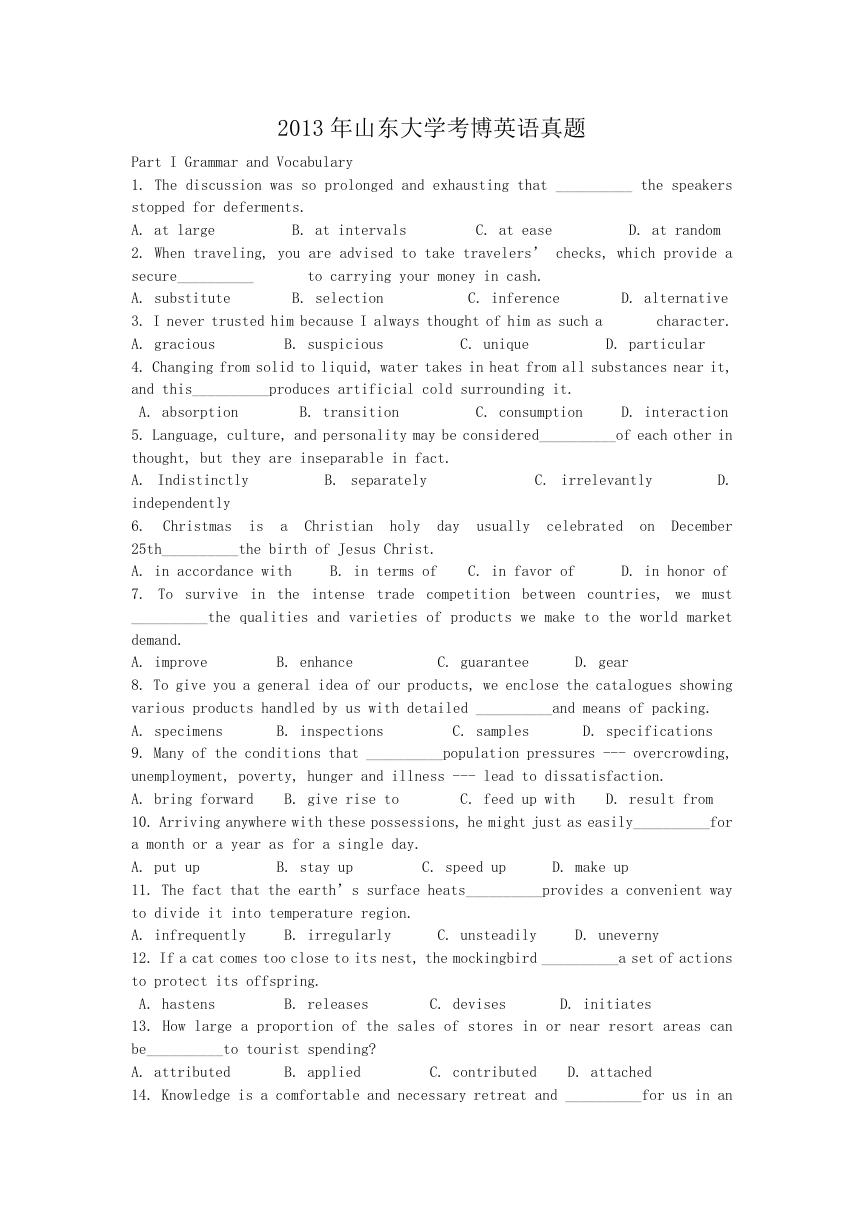
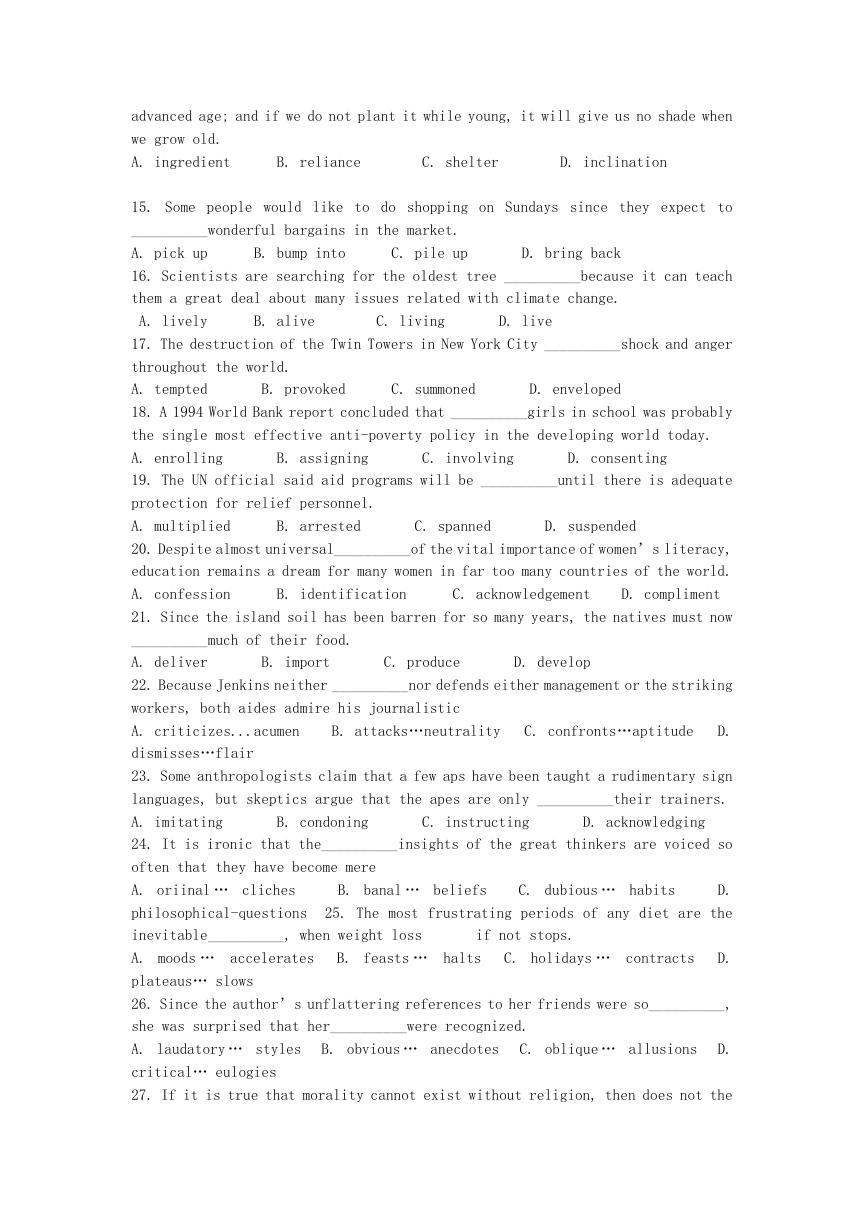
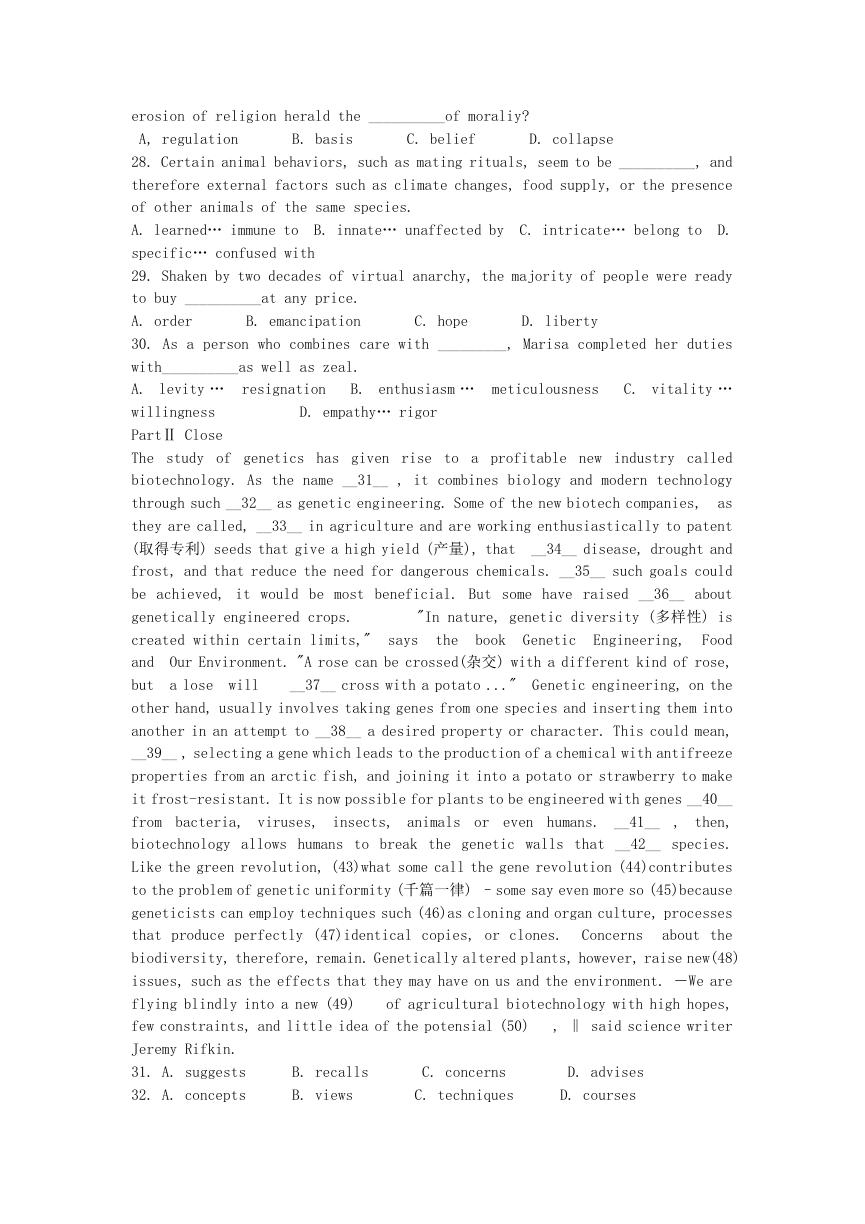
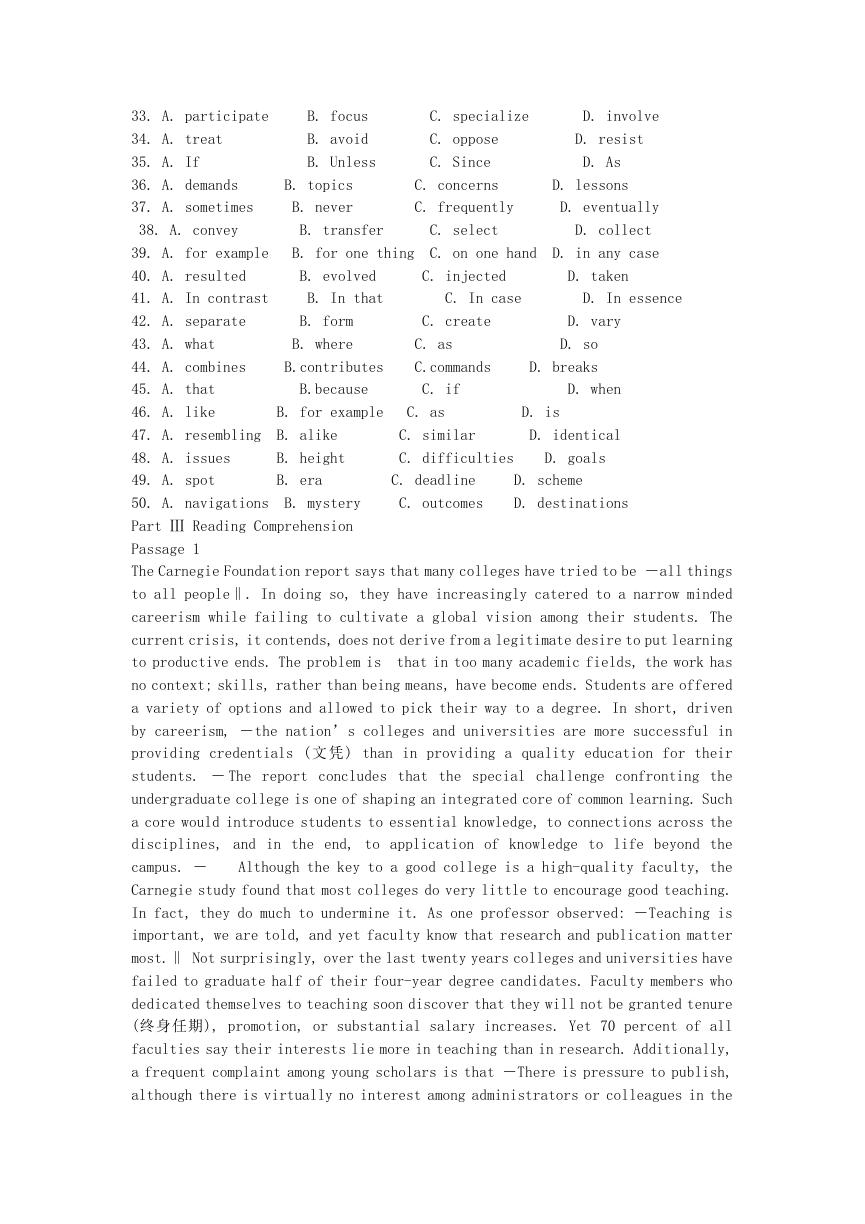
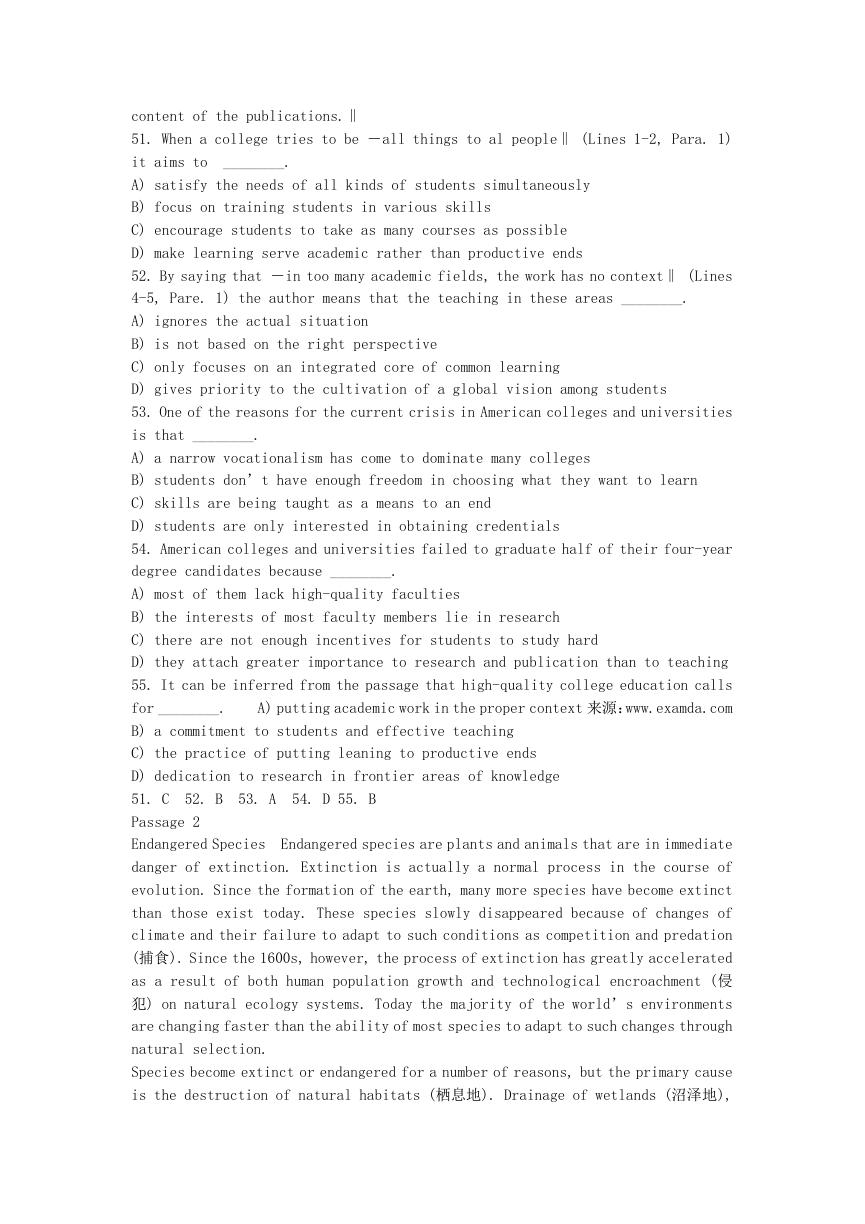

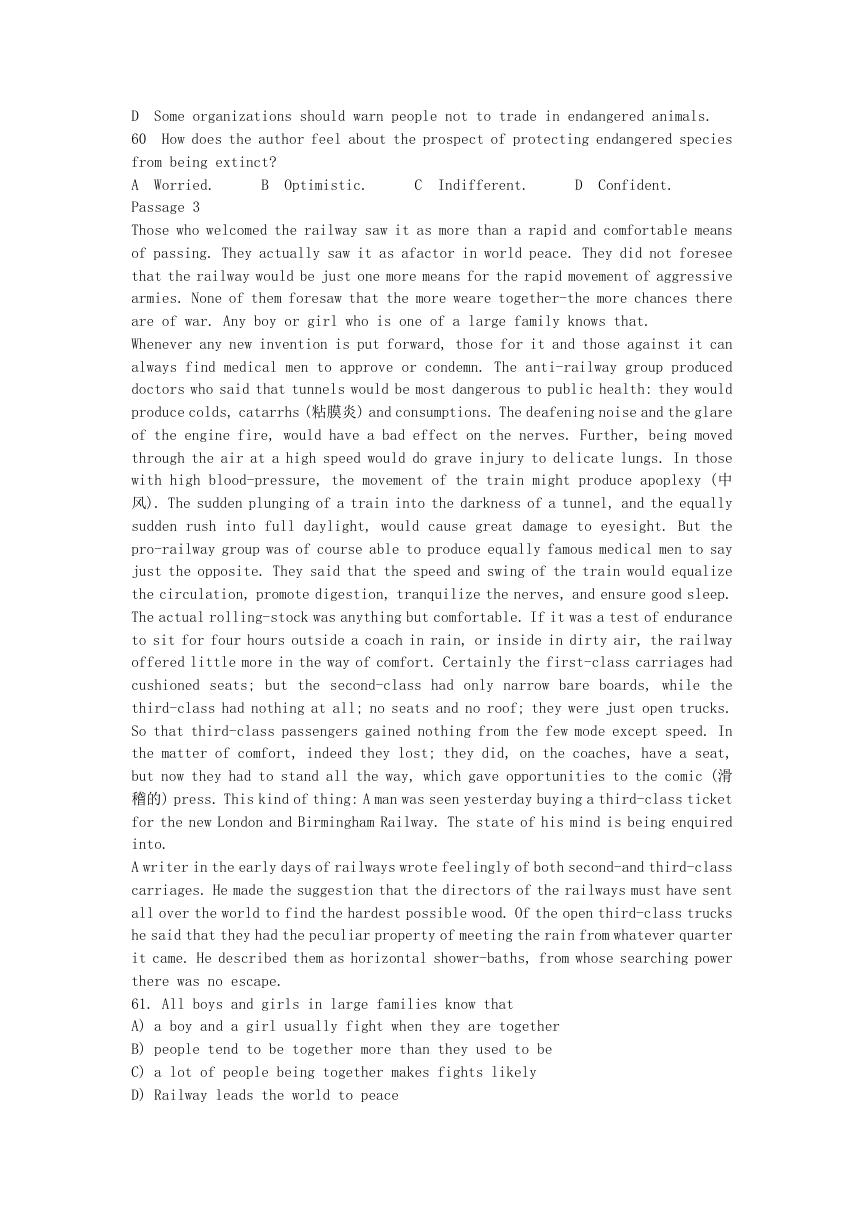
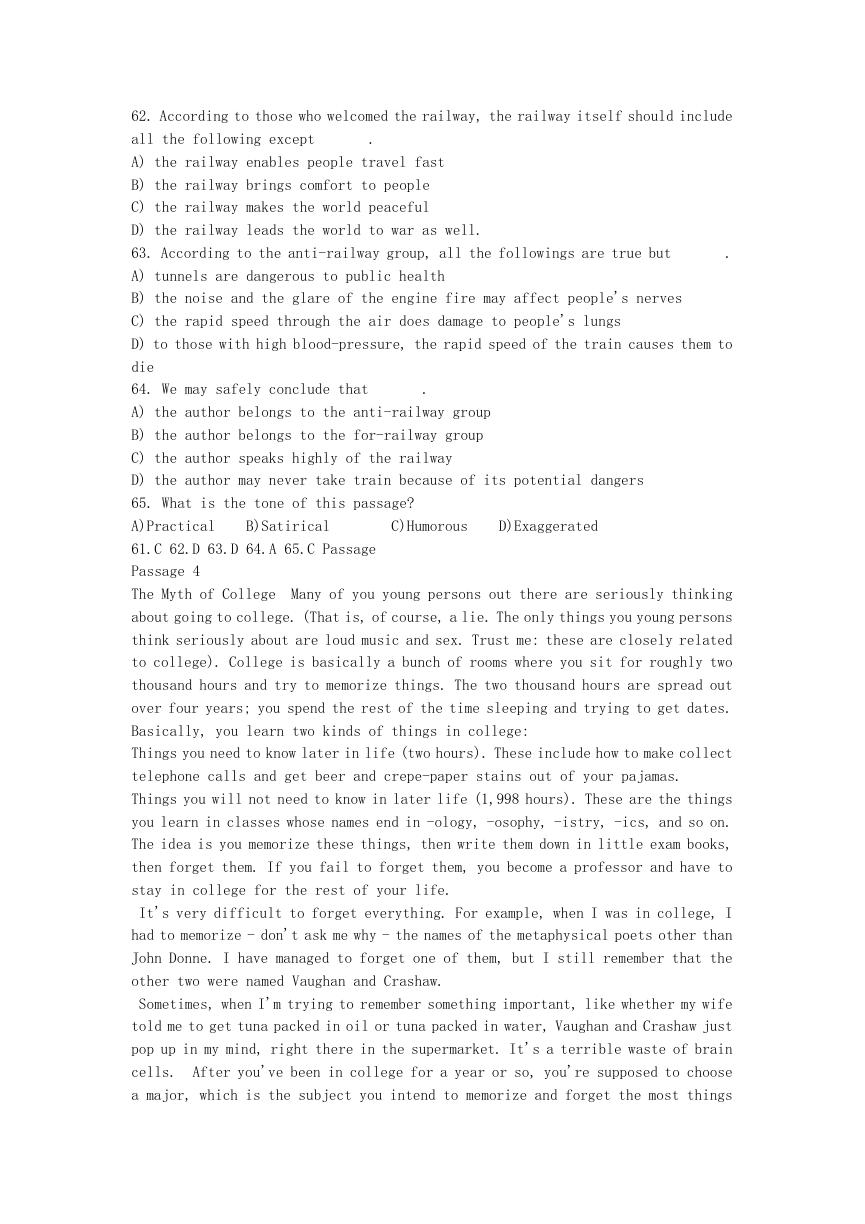








 2023年江西萍乡中考道德与法治真题及答案.doc
2023年江西萍乡中考道德与法治真题及答案.doc 2012年重庆南川中考生物真题及答案.doc
2012年重庆南川中考生物真题及答案.doc 2013年江西师范大学地理学综合及文艺理论基础考研真题.doc
2013年江西师范大学地理学综合及文艺理论基础考研真题.doc 2020年四川甘孜小升初语文真题及答案I卷.doc
2020年四川甘孜小升初语文真题及答案I卷.doc 2020年注册岩土工程师专业基础考试真题及答案.doc
2020年注册岩土工程师专业基础考试真题及答案.doc 2023-2024学年福建省厦门市九年级上学期数学月考试题及答案.doc
2023-2024学年福建省厦门市九年级上学期数学月考试题及答案.doc 2021-2022学年辽宁省沈阳市大东区九年级上学期语文期末试题及答案.doc
2021-2022学年辽宁省沈阳市大东区九年级上学期语文期末试题及答案.doc 2022-2023学年北京东城区初三第一学期物理期末试卷及答案.doc
2022-2023学年北京东城区初三第一学期物理期末试卷及答案.doc 2018上半年江西教师资格初中地理学科知识与教学能力真题及答案.doc
2018上半年江西教师资格初中地理学科知识与教学能力真题及答案.doc 2012年河北国家公务员申论考试真题及答案-省级.doc
2012年河北国家公务员申论考试真题及答案-省级.doc 2020-2021学年江苏省扬州市江都区邵樊片九年级上学期数学第一次质量检测试题及答案.doc
2020-2021学年江苏省扬州市江都区邵樊片九年级上学期数学第一次质量检测试题及答案.doc 2022下半年黑龙江教师资格证中学综合素质真题及答案.doc
2022下半年黑龙江教师资格证中学综合素质真题及答案.doc